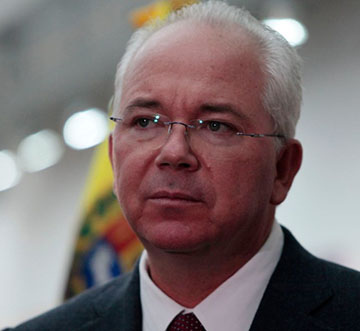CARACAS, (Reuters) – A report by a Venezuelan congressional commission accused Petroleos de Venezuela (PDVSA) of corruption yesterday, saying about $11 billion in funds went missing from the state-run oil company while Rafael Ramirez was at the helm from 2004-14.
“It is more than the (annual) budget of five Central American countries,” said Freddy Guevara, comptroller commission president and a member of one of Venezuela’s hardline opposition parties, alleging widespread malfeasance at the state oil producer. “We’re talking about $11 billion they cannot justify,” he added, as he presented a report by the legislative body that audits the state.
PDVSA, which manages the world’s largest oil reserves, brings in about 95 percent of Venezuela’s export revenues and has been the country’s financial engine during 17 years of leftist rule in the OPEC member nation.

Critics have long accused PDVSA of corruption, but the company has maintained it is the target of a right-wing smear campaign, led by the United States and compliant international media, to sabotage socialism.
Neither PDVSA nor Ramirez, currently Venezuela’s United Nations envoy, responded immediately to requests for comment on the report by the commission headed by Guevara.
Venezuela is engulfed in a protracted economic crisis exacerbated since 2014 by a sharp decline in world oil prices.
Raising the spectre of default, cash-strapped PDVSA said on Monday it “could be difficult” to pay large looming debt commitments if a proposed $5.3 billion bond swap does not go through.
“If PDVSA is unable to pay its international creditors … it is because they robbed this money,” said Guevara, a former student leader and member of the Popular Will Party. As he addressed his fellow lawmakers, he flicked between slides illustrating what he described as various cases of wrongdoing at PDVSA, repeating: “Where is the money?”
The congressional investigation focuses on 11 cases, ranging from known scandals in an Andorran bank and PDVSA pension funds to alleged overpricing in purchases of oil equipment.
The accusations are based in part on documents from PDVSA, auditor KPMG and foreign investigations.
Interviews with a KPMG representative showed the company had informed PDVSA’s auditing committee of “frauds,” the report said.
“The representatives of PDVSA had FULL KNOWLEDGE of the existence of administrative irregularities,” the report reads, adding KPMG has not provided further details, citing confidentiality policies.
The U.S. Justice Department has said there is a large, ongoing investigation into bribery at PDVSA.
In the most high-profile case to date, a Venezuelan businessman pleaded guilty in a U.S. court in June to violating the Foreign Corrupt Practices Act for his role in a scheme involving PDVSA officials. U.S. authorities have linked more than $1 billion to the scheme.
In the Andorran case, the United States alleged last year that a bank there had facilitated the laundering of $4.2 billion of Venezuelan money.
In addition to the 11 cases documented in the report, Guevara told Reuters the commission was currently investigating another six.
One slide displayed by Guevara titled “Those involved,” showed dozens of arrows pointing at Ramirez, who served as Venezuela’s oil czar for a decade before being sent to the U.N.
The commission called on the National Assembly to deem Ramirez “politically responsible” for the irregularities and recommended a “no-confidence vote” against current PDVSA President Eulogio Del Pino. “We’re seeking lawsuits – criminal and civil – against all those involved here,” Guevara said, adding he had not received any official reply from PDVSA or its current and former executives.
The investigation may have little impact, however, as President Nicolas Maduro’s government has sidelined Congress since the opposition won control in a December vote and the Supreme Court has annulled all its major decisions.
Ruling Socialist Party lawmakers did not attend yesterday’s session, where the commission approved the report.
PDVSA’s Del Pino has in recent weeks accused media and opponents of inventing lies about the company. He personally filed a lawsuit for defamation against one Venezuelan newspaper after it said PDVSA was in financial trouble.
